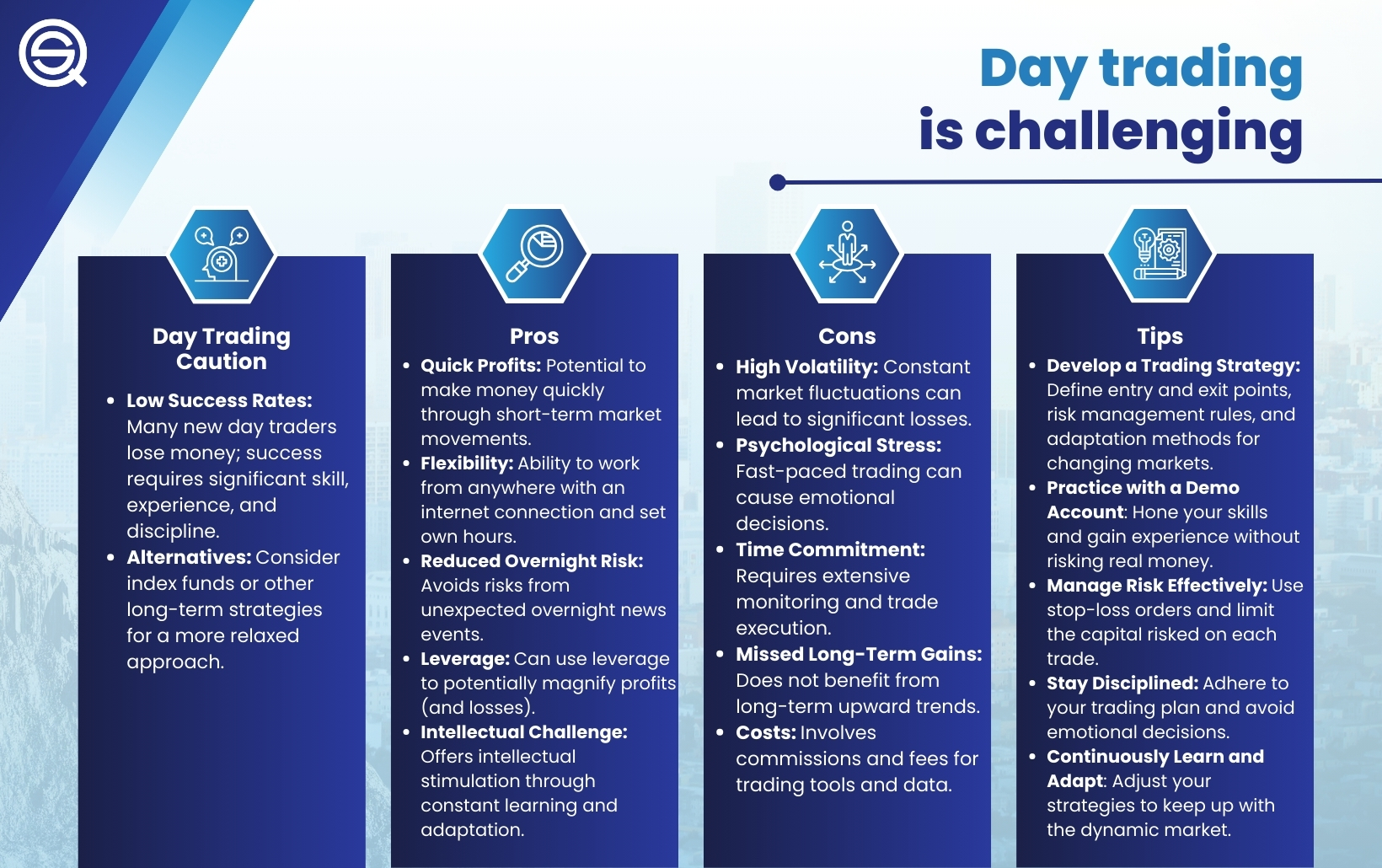Did you know that the average goldfish has a longer attention span than a day trader? While the fast-paced world of day trading can be exhilarating, it also comes with significant psychological risks that can impact decision-making and overall success. This article dives into the main psychological pitfalls day traders face, from stress and impulsivity to overconfidence and emotional burnout. We explore how mental health issues and loss aversion can cloud judgment, and share strategies for managing anxiety during volatile markets. Discover the importance of discipline, mindfulness, and effective techniques to handle trading losses, all aimed at fostering a healthier trading mindset. Join us at DayTradingBusiness to navigate these challenges and enhance your trading performance!
What are the main psychological risks of day trading?
The main psychological risks of day trading include emotional burnout, impulsive decisions driven by fear or greed, and increased stress leading to anxiety or depression. Traders often face pressure to make quick profits, which can cause emotional swings and loss of confidence. The constant risk of losing money can trigger panic or overconfidence, impairing judgment. Managing these risks involves setting strict rules, taking regular breaks, and maintaining emotional discipline.
How does stress affect day traders’ decision-making?
Stress impairs day traders’ decision-making by causing impulsivity, reducing focus, and increasing emotional reactions. High stress levels lead to poor judgment, hasty trades, and ignoring risk management. It can also cause traders to deviate from their strategies and chase losses. Managing stress through techniques like breaks, mindfulness, and proper risk limits helps maintain clearer, more disciplined decisions.
What mental health issues are common among day traders?
Common mental health issues among day traders include anxiety, stress, burnout, and impulsive decision-making. They often face fear of losing money, which can lead to panic attacks or obsessive behaviors. The high-pressure environment can cause emotional exhaustion and difficulty managing risk. Over time, these stressors may contribute to depression or substance abuse. Managing these risks involves setting strict trading limits, taking breaks, and maintaining a healthy work-life balance.
How can fear impact day trading success?
Fear can cause premature exits or hesitation, leading to missed gains in day trading. It may trigger emotional decisions, causing losses or overcautious moves. Fear can also increase stress, impair judgment, and reduce confidence, making it harder to stick to your trading plan. Managing fear through discipline, proper risk management, and emotional control is essential for successful day trading.
Why is impulsivity a danger in day trading?
Impulsivity in day trading leads to rash decisions, causing big losses. It triggers emotional trades based on fear or greed instead of analysis. Acting on impulse skips proper risk management, increasing the chance of significant financial damage. It also makes traders ignore their strategies, risking reckless moves during volatile markets.
How does overconfidence influence trading behavior?
Overconfidence leads traders to take bigger risks, ignore warning signs, and overestimate their abilities, often resulting in larger losses. It makes traders more likely to hold onto losing positions, believing they’ll rebound, which worsens losses. Overconfident traders also trade more frequently, increasing transaction costs and emotional stress. This psychological bias can cause impulsive decisions, reducing discipline and increasing vulnerability to market swings. Recognizing overconfidence helps traders stay cautious, stick to their plans, and avoid costly mistakes.
What are the signs of emotional burnout in traders?
Signs of emotional burnout in traders include persistent fatigue, irritability, loss of motivation, decreased focus, emotional numbness, and frequent mistakes. They may feel overwhelmed, anxious, or detached from trading decisions. Sleep disturbances and cynicism about trading success also indicate burnout.
How can traders manage anxiety during volatile markets?

Traders manage anxiety during volatile markets by sticking to a solid trading plan, practicing disciplined risk management, and avoiding emotional decisions. Taking regular breaks, staying hydrated, and maintaining a healthy routine help keep calm. Using stop-loss orders limits losses and reduces worry. Focus on process rather than outcomes to prevent overreacting to market swings. Mindfulness and breathing exercises can calm nerves. Remember, volatility is part of trading—accept it rather than fight it.
What strategies help prevent trading addiction?
Set strict trading limits and stick to them. Use a predetermined stop-loss to avoid emotional decisions. Take regular breaks to prevent impulsive trades. Keep a trading journal to recognize patterns and emotional triggers. Focus on education and understanding rather than chasing quick gains. Seek support or counseling if trading feels compulsive. Maintain a balanced lifestyle outside trading to reduce obsession.
How does loss aversion affect trading choices?

Loss aversion makes traders fear losses more than they value gains, leading to risk-averse behavior like holding onto losing positions too long or avoiding profitable trades. It causes impulsive decisions to cut winners early or hold onto losers, hoping to avoid admitting mistakes. This bias skews judgment, making traders react emotionally instead of logically, which often results in poor trading performance.
What role does discipline play in avoiding psychological pitfalls?
Discipline helps traders stick to their strategies, preventing impulsive decisions that lead to emotional pitfalls like fear and greed. It keeps emotions in check, reducing the risk of overtrading or revenge trading after losses. By maintaining consistent routines and rules, discipline minimizes psychological stress and helps avoid panic or hope-driven mistakes. It creates mental resilience, allowing traders to handle losses calmly and stay focused on long-term goals.
How can mindfulness improve trading performance?
Mindfulness helps traders stay present, reducing impulsive decisions driven by emotions. It sharpens focus, making it easier to follow strategies and avoid panic trades. By increasing self-awareness, mindfulness helps identify emotional triggers, preventing them from sabotaging trades. Practicing mindfulness lowers stress and anxiety, improving emotional resilience during volatile markets. Overall, it cultivates a calm, disciplined mindset essential for consistent trading success.
Learn about How Can Mindfulness Improve Trading Psychology?
What are effective ways to handle trading losses emotionally?

Accept losses as part of trading; view them as lessons. Maintain discipline with a clear trading plan to avoid emotional reactions. Take breaks when emotions run high to reset your mindset. Keep a trading journal to track feelings and decisions, helping you learn from mistakes. Practice mindfulness or meditation to stay calm and focused. Limit your trading size to reduce emotional stress. Remember, losses aren’t failures—they’re feedback.
How does lack of sleep impact trading decisions?
Lack of sleep impairs judgment, slows decision-making, and increases emotional reactions, leading to impulsive trades and poor risk management. It dulls focus, making traders overlook critical details and patterns. Sleep deprivation also heightens stress and anxiety, causing overtrading or sticking to losing positions. Overall, it reduces cognitive clarity, making smart trading decisions harder under sleep loss.
Learn about How Do Fear and Greed Impact Day Trading Decisions?
What tools or techniques can reduce psychological stress in trading?
Use mindfulness meditation to stay present and reduce anxiety. Set strict trading plans to avoid impulsive decisions. Practice deep breathing exercises during stressful moments. Take regular breaks to clear your mind and prevent burnout. Keep a trading journal to analyze emotions and patterns. Limit screen time and avoid overtrading to reduce mental fatigue. Develop a solid risk management strategy to build confidence and reduce fear. Seek support from trading communities or a mental health professional if stress becomes overwhelming.
Conclusion about Psychological Risks in Day Trading and How to Handle Them
In summary, understanding and addressing the psychological risks inherent in day trading is crucial for long-term success. By recognizing the impact of stress, fear, impulsivity, and overconfidence, traders can implement strategies to enhance discipline and mindfulness. Additionally, managing anxiety and emotional responses to losses can significantly improve decision-making. For comprehensive insights and support on these challenges, DayTradingBusiness offers valuable resources to help traders navigate the mental landscape of day trading effectively.
Learn about How to Handle Foreign Day Trading Tax Regulations